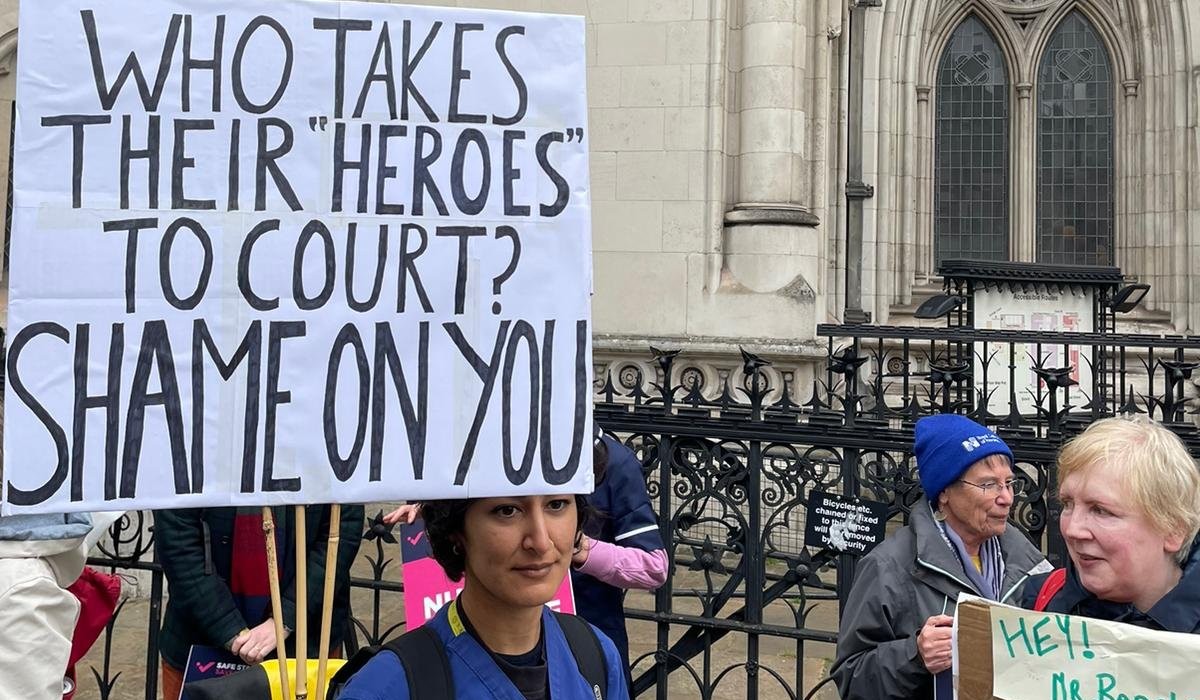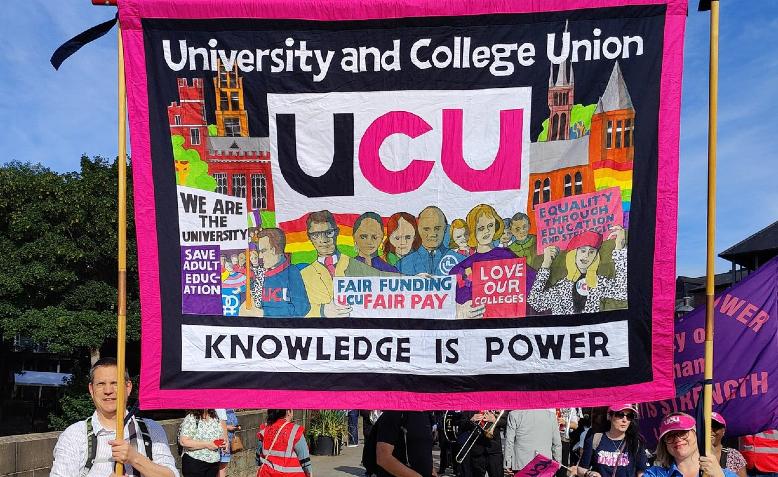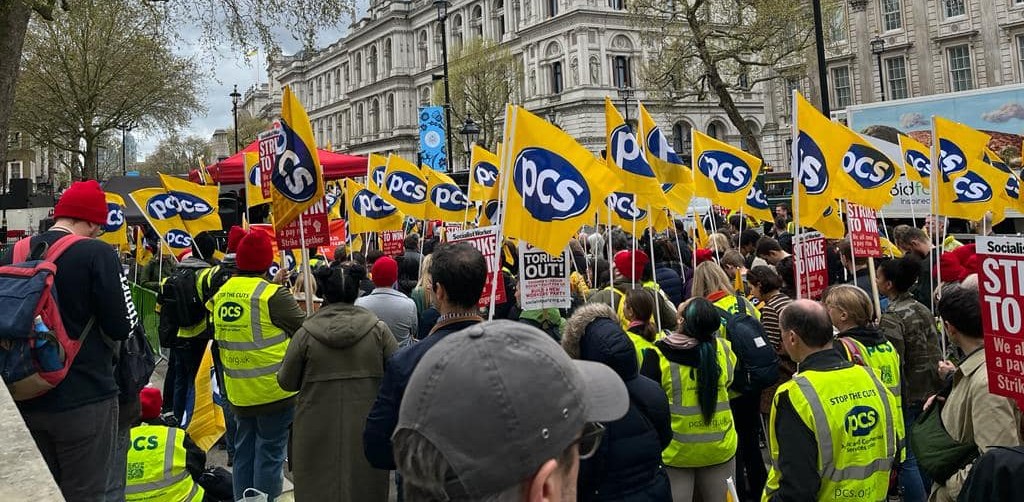 RCN members protest outside the high court. Photo: @heccles94 / Twitter
RCN members protest outside the high court. Photo: @heccles94 / Twitter
Counterfire’s weekly digest with the latest on strikes and workplace struggles
You can sign up to receive News from the Frontline straight in your inbox
Ahead of the next wave of strike action by nurses in the RCN, Tory ministers went to the high court on Thursday to block the second strike day on a technicality of the anti-union laws, and horrifically won. This means nurses will be out on the picket lines from 8pm on Sunday 30 April until 8pm on Monday 1 May instead of the 2nd as originally called.
The government using the law as a battering ram to break workers’ action comes after RCN members delivered a massive rebuke to the Tories just weeks ago by voting to reject a poverty pay deal, an act that definitely angered the well-paid economists at the Bank of England. It was a heroic act given that many other sections of workers have departed the battlefield against the government.
This was the case even more because it had to be fought for by rank-and-file nurse activists against the RCN’s leadership, who went into panic mode and made wild accusations of wrongdoing against their own members. They even threatened to get the police involved, but this did not break the nurses’ resolve. The victory for rank-and-file nurses in defeating the bad deal no doubt played a role in a majority of NHS workers in Unite rejecting the same deal (as well as the union not recommending acceptance). Unite NHS workers will be back out on strike on 1 and 2 May.
The Tories winning the court case against the RCN means that strikes between nurses and Unite health workers in some regions and with teachers in the NEU nationally can’t be coordinated on the 2nd. However, the Tories taking the RCN to court and its continuing attempt to pass minimum service level legislation should clarify that they have never been acting in good faith, and there is little point in unions limiting the fight over ‘talks’.
Hopefully RCN members will be even more resolved to vote in large numbers in their upcoming re-ballot to renew their strike mandate. But there is also an urgent need to discuss strategy, including escalation and coordination, beating the anti-union legislation and building on the rank-and-file organisation that has been developed in recent weeks. Everyone needs to be out on the NHS picket lines on Monday to show maximum support, to join the NHS march in London from 12pm at St Thomas’ Hospital to Trafalgar Square, and to get to the 10 June How We Fight, How We Win conference.
10 June rank-and-file conference: T minus six weeks
The conference is a chance to bring together grassroots activists from across the working-class movement to discuss how to increase coordination, how to push for better deals, escalate action and to combat government attacks on our movement.
See here for the latest updates on this crucial event and how to build it. Book your place now.

FE: the battle’s not over
Havant and South Downs College (HSDC) saw two days of strike action this week (Tuesday 25 April and Thursday 27 April) in their ongoing pay dispute.
UCU branch chair Steve Pattenden says:
“Staff at HSDC continue to face severe financial difficulties due to the cost of living crisis and this, on top of excessive workloads, has pushed them to breaking point.
“Staff should be given the professional respect of a pay increase that reflects the work they do, which ensures students receive professional, technical and academic excellence at HSDC”
This action has the added zest of coordination with the NEU on both days.
Meanwhile in Northern Ireland, FE workers have rejected a truly measly pay offer of 2% over two years.
NASUWT represent a lot of FE staff in NI, their Justin McCamphill says:
“Lecturers were offered 2% for 2021-22 and have now been told that this is unaffordable.
“The employers are in cloud cuckoo land if they think lecturers are prepared to accept a lower offer. Lecturer pay is now a long way behind schoolteacher pay. Our members have had enough and the strike action called for this Wednesday (26 April) will go ahead as planned.”
Education could still be the fault line that unpicks our rulers.
Tory anti-union repression faces international opposition
Banning more strikes is of course, a key objective for the Tories right now. They have been driving through legislation to make effective trade union actions almost impossible under the law by demanding every single union maintain “minimum service levels”. This is a nonsensical requirement that would be close to a strike ban.
The Tories have been arguing in parliament that this extreme legislation is in-line with similar laws in numerous other countries. In a blow to that argument, 121 members of parliament from 18 other countries, including all the ones the Tories claim have the same law, have signed a statement condemning the legislation. The signatories are politically diverse and include government ministers in countries like Australia and Spain.
Britain already has anti-union laws that are more restrictive than any other Global North country. The new laws will give us a level repression more like that of a dictatorship than a notional democracy. The entire movement has to be ready to fight.
Prospect: Welsh government workers have had enough
Prospect members at the Welsh government and Natural Resources Wales will walk out for two days in May and June in a dispute over pay.
Prospect’s Daniel Maney says:
“After more than a decade of real terms pay cuts, the cost of living crisis has pushed our members over the edge. Having worked tirelessly through the pandemic, it is only fair that they are rewarded in line with their colleagues in education and health.”
This is against a backdrop of thousands of Welsh civil servants walking out with the PCS from the 28 April. The fight for decent public sector pay is far from over.
Universities: the gloves are off
University lecturers have begun a marking and assessment boycott and have been met with a vicious response by university managements threatening up to 100% pay deductions. Read Counterfire UCU members’ analysis on the battle in higher education, and what two recent victories show about what needs to be done.

Strike wave rolls out to North Sea energy installations
Fossil fuel giants operating in the North Sea, including BP, Shell, Total, CNRI and a host of smaller operators face ‘a tsunami of industrial action’ if bosses do not address the falling value of workers’ wages due to inflation.
That was the response of Unite, after 1,300+ offshore workers staged a 48-hour strike on Monday and Tuesday. The strikers, who include electrical, mechanical and production technicians, as well as scaffolders, pipefitters, crane operators and deck crew, are demanding increases in their pay, to keep their earnings up with inflation which has now been in double figures for over a year.
They are not impressed by the Chancellor’s call for people to suffer short-term pain to bring inflation under control:
“This industry has been sucking up mega-profits to such an extent that even the Tory government has brought in a windfall tax on them. All we want is a bit of that to come our way instead of into offshore accounts.”
The strikers are just the latest group of construction and maintenance workers to join the rolling strike wave that has hit the energy sector in recent months – from Aberdeen to Milford Haven by way of Sizewell, as reported in previous NFTF reports.
Heathrow security officers pledge strikes over May bank holidays
1,400 security officers at Heathrow Airport Ltd (HAL) have pledged to walk out next week, on May 4, 5, 6, 9 and 10 unless management seriously address their anger over pay. The security officers are members of Unite, and have already taken 10 days of strike action over the Easter holiday period, which resulted in the airport having to cancel hundreds of flights. They warn that the strikes will be repeated at the end of May if there is not real progress.
A union survey revealed that more than a third of the workforce were looking to leave their jobs because of the pay – currently a miserly £26,000 basic pay after 3 years, which can be boosted by a further £4,000 if they permanently work changing shifts.
This compares with the £1.5m paid to the CEO – so he ‘earns’ in a week what a security officer earns in a year. Or to put it another way, as one Unite rep explained:
“If a school leaver started work here, and stayed until they retired, they would not have earned as much, over 50 years, as John Holland-Kaye got paid last year.”
PCS members strike en masse
Over 130,000 PCS members walked out in a nationally coordinated strike on Friday. The message to the government was clear: pay up or face immense disruption. In London, hundreds of civil servants mobilised outside the Number 10 gates in a show of defiance. PCS is currently re-balloting its members to renew their strike mandate for a further six months.

Unite strike puts brakes on Ferrari and Rolls Royce production
Unite members at Trelleborg in Tewkesbury and Bridgewater are to take strike action from 2-5 May over a below inflation pay offer. Trelleborg, who make seals for Rolls Royce, Ferrari and AirBus, have made over £28m according to recent financial reports yet have only offered a 5.2% ‘pay rise’ to staff. With RPI inflation currently running at 13.5%, around 200 Unite members at the firm have voted to reject the below-inflation pay offer and instead voted for strike action.
Unite general secretary Sharon Graham said:
“Trelleborg is making big profits yet is demanding its workers swallow a substantial real-terms pay cut. All our members are demanding is a decent wage rise, which the employer can undoubtedly afford to pay.”
Huge public-sector strike unfolds across Canada
Federal workers in Canada are striking back against austerity and gaining wide solidarity, but action needs to be escalated to win, argues John Clarke
Join Revolution! May Day weekender in London
The world is changing fast. From tariffs and trade wars to the continuing genocide in Gaza to Starmer’s austerity 2.0.
Revolution! on Saturday 3 – Sunday 4 May brings together leading activists and authors to discuss the key questions of the moment and chart a strategy for the left.

